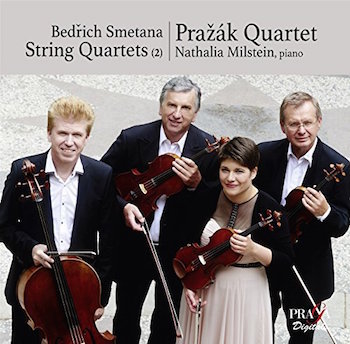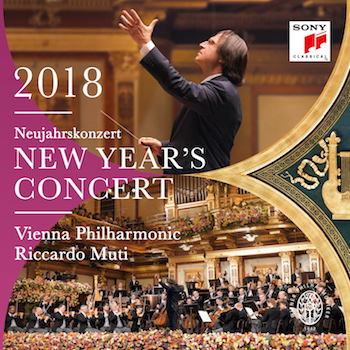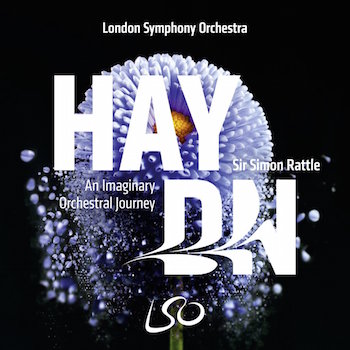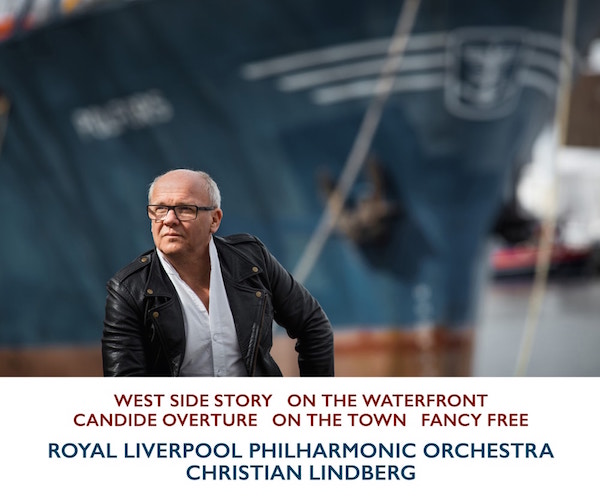CD Reviews: Smetana String Quartets, 2018 New Year’s Concert, Haydn: An Imaginary Orchestral Journey, and Lindberg conducts Bernstein
Pražák Quartet’s Smetana is keeper, Sir Simon Rattle’s Haydn is a loser, Vienna Philharmonic Orchestra’s New Year’s Concert is typical, and Lindberg’s “On the Waterfront” is a knockout.
By Jonathan Blumhofer

Here are earthy, intense takes on Bedrich Smetana’s two string quartets by the Pražák Quartet. The familiar String Quartet no. 1 (“From my life”) is turned inside out: aggressive and gritty, boisterous (the second movement galumphs with rustic brio), and tragic. But this approach seems to perfectly mirror the character of the music, which seethes with life – and pathos (the shattering harmonics at the end of the finale come like a shot out of the blue).
The String Quartet no. 2 was finished in 1883, seven years after the First. It’s a direct, tempestuous score, whose first movement features toccata-like runs paired with two contrasting melodic themes. A polka-inflected scherzo with a beautiful, lush trio follows. Stormy sections and passionate, lyrical ones alternate in the third, while the short finale dances amiably. The Pražák’s play it all with plenty of passion and a keen ear for detail: it’s particularly nice to hear the inner voices popping out of the textures so regularly, especially in the third movement.
A fervent reading of Smetana’s 1855 Piano Trio fills out the Praga album. In it, pianist Nathalia Milstein imbues the almost-non-stop keyboard part with color and rhythmic weight, especially during her short, first-movement cadenza. The ensemble’s boldest gestures are always strongly etched, but the delicate ones – like the several frolicking episodes of the second movement – are pristine. And, rhythmically, their playing is tight, especially during the finale’s several battles between duplets and triplets.
In all, then, a keeper.

This year’s Vienna Philharmonic Orchestra (VPO) New Year’s Concert was the fifth to be led by Riccardo Muti and, in some regards, it is his strangest. There’s a stiff account of the “Entry March” from Johann Strauss, Jr.’s Der Zigeunerbaron, a weirdly flat-footed rendition of Franz von Suppé’s Boccaccio Overture, and a surprising dud from Johann Strauss, Sr. (the Wilhelm Tell Galopp).
But once Muti gets those pieces out of his system in this Sony Classical recording (and they’re all on the first of the album’s two discs), things settle down and we end up with a fairly typical concert. The highlights aren’t so much the rarities – though there are a couple (Josef Strauss’s Wiener Fresken and Johann Jr.’s Myrten-blüthen, particularly) that stand out.
No, what’s striking here is the Italianate warmth Muti draws out of chestnuts like G’schichten aus dem Wienerwald and Rosen aus dem Süden, the swagger of the Festmarsch and the lush charm he mines from the polka-mazurka Stadt und Land. It can be easy to take these things for granted but Muti and the VPO’s attention to the little details in the music – the exaggerated dynamics at the end of Leichtes Blut, for instance, or the snappy rhythms of the Un ballo in maschera quadrille – really elevate their performances.
Alas, there’s nothing here by Josef Lanner or Eduard Strauss (although Alfons Czibulka makes his New Year’s Concert debut with Stephanie-Gavotte). That’s a pity. Maybe next year (the concert’s to be led by Christian Thielemann) that’ll change. Let’s hope so.

The concept behind this album is easy enough: Franz Josef Haydn is one of the most innovative composers in the Western canon. Why not compile a selection of his most visionary works, make a recording of them, and sell it as something fresh? Throw in Sir Simon Rattle in his first year as music director of the London Symphony Orchestra (LSO) and how can you miss?
In a couple of ways, actually.
The first is that Haydn, for all his brilliant wit, wasn’t into gimmicks: he was a serious composer who probably wrote fewer wrong notes, per capita, than anyone in the profession to date.
And this LSO Live disc of bleeding chunks feels hopelessly contrived. What you have is a random assortment of Haydn-iana: movements from six symphonies (nos. 6, 45, 46, 60, 64, and 90) plus snatches of The Creation, The Seasons, L’isola disabitata, and the Music for Musical Clocks. Heaven forbid anything approaching musical context come into play. The result is that twelve of the thirteen tracks lack any of the dramatic potency that you’d find in a performance of, say, one of the complete symphonies excerpted (the exception being the Music for Musical Clocks, which is wacky and sounds arbitrary and a little crazy in any setting).
Then, there are the performances themselves, which range from the spirited (the finales of the 60th and 90th Symphonies, Music for Musical Clocks) to the commonplace (the “Vorstellung” from Creation) to the sleepy (the movements from Symphony no. 6 and 64). The LSO’s playing isn’t, in itself, sloppy or bad, but there’s too little excitement generated across these readings to redeem the shortcomings of the program’s conceit.

If you only know Christian Lindberg as a charismatic trombonist, well, it also turns out he’s a pretty dynamic conductor as well. His new all-Bernstein recording for Bis with the Royal Liverpool Philharmonic Orchestra (RLPO) is a doozy.
Its zenith is reached in an absolutely blistering performance of the Suite from On the Waterfront. Extracted from Bernstein’s only film score, it’s only about twenty minutes long. Bernstein recorded it twice and the earlier account (from 1963 with the New York Philharmonic) is the more energetic, though the recorded sound is a bit dated.
Lindberg and the RLPO match the youthful Bernstein vim while also drawing out the music’s simmering tensions: in this reading there are no dry spots. Rather, the Suite’s rhythms are taut, tempos lively, instrumental colors blaze (especially the raucous, melancholy saxophone solos), and the music broods with an awesome, brittle fury.
The rest of the disc is strong, if not quite as perfect as Waterfront.
Lindberg gets the three “Dance Episodes” from On the Town to sound jazzy enough, though the fast outer two are taken a bit deliberately. Ditto the three “Dance Variations” from Fancy Free, though the conductor milks Bernstein’s writing for brass for about all it’s worth – and, from a sonic perspective, it sounds terrific.
Filling things out are a lively Candide Overture and a Symphonic Dances from West Side Story that, again, showcase the brass as flatteringly as they’ve ever been presented in these works on disc. But the real reason to get this album is On the Waterfront: Lindberg and the RLPO knock that score clean out of the park.
Jonathan Blumhofer is a composer and violist who has been active in the greater Boston area since 2004. His music has received numerous awards and been performed by various ensembles, including the American Composers Orchestra, Kiev Philharmonic, Camerata Chicago, Xanthos Ensemble, and Juventas New Music Group. Since receiving his doctorate from Boston University in 2010, Jon has taught at Clark University, Worcester Polytechnic Institute, and online for the University of Phoenix, in addition to writing music criticism for the Worcester Telegram & Gazette.
